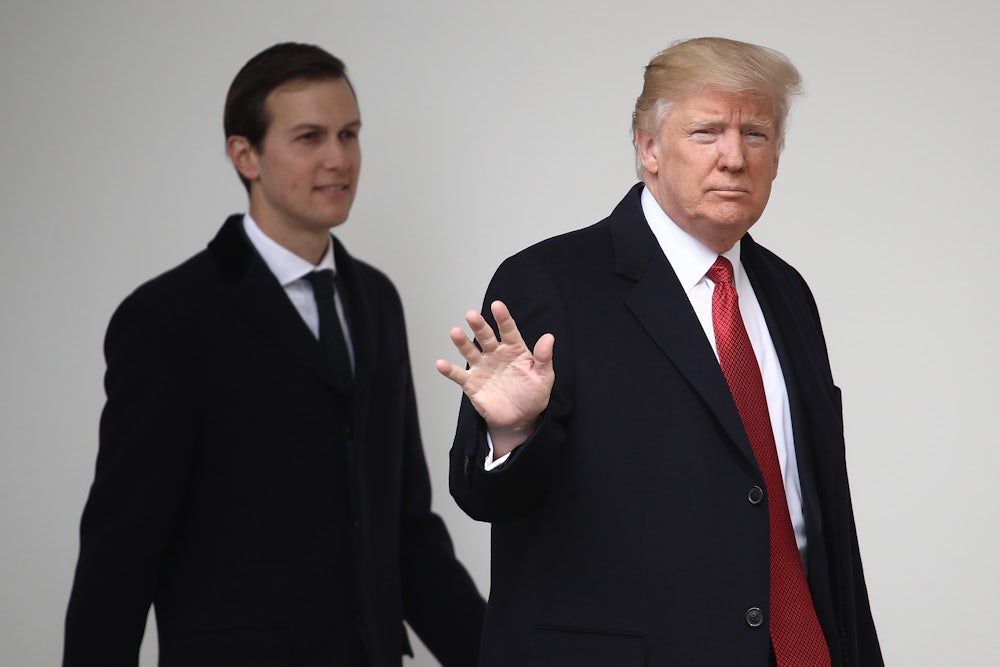Because Jared Kushner is Donald Trump’s son-in-law, conventional wisdom holds that he is the Trump administration’s one untouchable figure—and that Trump’s chief political adviser, Steve Bannon, has set himself up for failure by getting crosswise with Kushner. “It’s not hard to handicap that one,” National Review editor Rich Lowry said Sunday on Meet the Press, “because there is only one person who can’t be fired in that equation.”
When the internecine fight between the two broke into public view, complete with an explosion of anti-Semitic internet vitriol directed at Kushner, speculation mounted that Bannon would either lose his job or come to heel. Heads Kushner wins, tails Bannon loses. The fact that writers at Bannon’s old haunt Breitbart have been told to lay off Kushner, after criticizing him repeatedly last week, is at least consistent with the view that Bannon’s predicament is hopeless.
But it is only hopeless if Trump’s loyalty to family outweighs any other consideration, which may not be a foregone conclusion. Bannon still has some leverage: Trump could have fired him outright; instead he demanded that Bannon and Kushner resolve their differences. Bannon is also almost certainly right about a key question dividing the White House: whether Trump can reverse his fortunes by transferring power from the nationalist “America first” wing of the administration to its plutocratic, relatively centrist wing.
In a way, Trump made Bannon his indispensable adviser by becoming a creature of the Breitbartian right himself. Bannon may be deluded about many things, but one thing he does not misapprehend is the extent to which the white ethnonationalist politics he and his boss practice have no crossover appeal.
“He has argued that Mr. Kushner’s efforts to pull his father-in-law more to the center on issues like immigration would poison him with the conservative base,” according to the New York Times, “a hopeless position to be in because Mr. Bannon believes so few Democrats would ever consider supporting Mr. Trump.”
TPM’s Josh Marshall sees it as a sign of peril for Bannon that he has been forced to make his case on Kushner’s terms, and that’s likely true, but the above insight is no less profound: Trump can’t un-run the campaign he just ran. Politicians often make too much of poisoned wells to rationalize counterproductive obstruction, but poison was the quintessence of Trump’s appeal. Even the popular aspects of his populism were cloaked in the language of revenge—of empowering his people at the expense of political aliens, like immigrants and minorities, who had overtaken them. There is no undoing the impression, widespread among Trump’s foes, that anything he supports must be regressive.
Consider what would happen if Trump undertook the pivot Kushner supports, marginalizing Bannon or driving him out of the administration along the way. First, the white nationalist core of his support would erode.
@RealDonaldTrump Steve Bannon is the lynchpin to your energized base. Conservatives are an endangered species in your White House.
— Steve King (@SteveKingIA) April 10, 2017
This is the source of Bannon’s leverage: He has a political constituency, whereas Kushner does not. Trump could pat Kushner on the head and tell him to take more family ski vacations, but if he neuters or fires Bannon, it will come with a cost—and a particularly severe one if Bannon pulls a murder-suicide. Bannon isn’t the most popular person in the Republican Party, and the party itself is struggling to cohere at the moment, but their self-interests align neatly so long as Bannon and Trump are singing from the same hymnal. If their agendas diverged, many of Bannon’s allied outlets in the conservative media, which thrives on conflict, would happily side with him over a Trump-Kushner regime.
As they war with the right, though, Trump and Kushner would gain no quarter from Democrats—unless Democrats were allowed to set the all the terms. This is Bannon’s central point. Democrats have no incentive to prop up Trump’s presidency for half-loaf compromises that many will suspect are contaminated with seeds of Trumpism. Trump can adopt or co-opt the Democrats’ infrastructure platform outright if he likes, but he can’t easily entice them to compromise with him, and he can’t entice House Speaker Paul Ryan or Senate Majority Leader Mitch McConnell to advance a trillion dollar direct-spending bill filled with environmental and labor protections that the GOP exists to oppose.
Which is just to say, Kushner wants Trump to chart a new course that leads to a substantive dead end for at least another 19 months. Bannon’s path, at least, preserves the hope of keeping his base consolidated through the legislative ebb. He can deregulate, scapegoat, and unburden law enforcement to turn his Herrenvolk fantasy into reality—all while keeping congressional investigators at bay.
There’s no real logical rebuttal to this, except to point to three months of chaos and humiliation as indicative of the futility of continuing to do things Bannon’s way. That is really an argument that Trump should get rid of both of his top advisers, but Trump is unlikely to grasp that in a contest between loyalists, both might deserve to lose. Family loyalty, and the beating his ego will take when the stories of his first 100 days are written, will pull him toward his son-in-law. And that’s when the real fun will begin.
